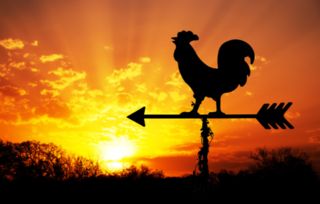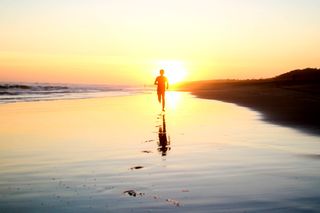Sleep
Up and at 'Em: 4 A.M. Risers May Have Quirky Chronobiology
Extreme chronotypes thrive on a very-early-to-bed, very-early-to-rise routine.
Posted August 19, 2019 Reviewed by Lybi Ma
In 2016, the Wall Street Journal did a profile of Apple Computer's C.E.O., Tim Cook, which described his daily habit of waking up every day at 3:45 A.M. with an up and at 'em, seize the day attitude.
With Cook as their new very-early-to-rise poster boy, the WSJ headline declared, "Why 4 A.M. Is the Most Productive Hour." This dictum ruffled a few night-owl feathers but also caused high-profile early birds to jump on social media and claim that the secret to their success was, indeed, getting up at 4 o'clock in the morning. Many overachievers started humblebragging that they had a superhuman ability to thrive on very little sleep.

This groundswell of people egging each other on to cut back on their sleep and peer-pressuring one another to "rise and shine!" at an ungodly hour if they wanted to be high-achievers, led to a backlash and a wave of "sleep hygiene" warnings. INC. magazine published two back-to-back articles addressing the issue; each article's title sums up the storyline: "I Tried Getting Up at 4 A.M. to Be More Successful. It Was Hell" and "Getting Up at 4 A.M. Doesn't Work for Most People for One Simple Reason." Which is: Sleep deprivation.
Earlier this summer, The New York Times jumped on the bandwagon of warning about the backlash of very-early-to-rise routines with an article, "Waking Up at 4 A.M. Every Day Is the Key to Success. Or to Getting a Cold." The gist of this article is that not getting enough sleep wears down your immune system, making getting sick more likely.
"Early to bed and early to rise makes a man healthy, wealthy, and wise." —Poor Richard's Almanac (by Benjamin Franklin, 1735)
Common sense and the timeless wisdom of Benjamin Franklin remind us that the perils of waking up at 4 A.M. have a simple remedy: Go to bed earlier. Presumably, Franklin was well aware of the importance of a good night's sleep and makes it clear in his famous proverb that early to bed and early to rise are two sides of the same coin.
Until recently, most experts have underestimated the degree to which some of us are chronobiologically hardwired with genes that predispose us to be night owls or extreme early birds.
That said, new research (Curtis et al., 2019) from the University of California, San Francisco reports that a certain percentage of the population are "extreme morning chronotypes" or "advanced sleepers" who thrive on a very-early-to-bed and very-early-to-rise routine. These findings were published on August 6 in the journal SLEEP.
Under the umbrella of advanced sleepers, there are three specific categories. The most common is called the "advanced sleep phase" or ASP. Some experts refer to adults who tend to fall asleep between 7 to 9 P.M. and have trouble staying up until 10 P.M. as having a "disorder" and refer to this syndrome as advanced sleep phase disorder or ASPD. However, the researchers at UCSF use the term ASP and appear to avoid labeling advanced sleepers or extreme morning chronotypes as having a so-called "disorder."
Based on their recent results, Curtis and coauthors make a conservative estimate one out of every 300 patients (0.33 percent) at a typical sleep clinic will have ASP. According to the researchers, until now, most sleep experts thought ASP was extremely rare; although 1/300 may seem like a small fraction of the population, this percentage was higher than previously thought.
Why Is ASP Associated with Early-to-Bed and Very-Early-to-Rise Routines?
Advanced sleepers tend to have quirky chronobiology and atypical circadian rhythms. Their body's internal clock is hardwired to release melatonin (a sleep-inducing hormone) hours earlier than most people, which triggers a drop in body temperature and early-evening drowsiness. Because of their unique circadian cycles, for many extreme morning chronotypes, 8 P.M. to 4 A.M. is the time window when their body's internal clock is naturally geared to get eight hours of sleep.

"While most people struggle with getting out of bed at 4 or 5 A.M., people with advanced sleep phase wake up naturally at this time, rested and ready to take on the day," the study's senior author, Louis Ptáček, said in a statement. "These extreme early birds tend to function well in the daytime but may have trouble staying awake for social commitments in the evening." Ptáček is a professor of neurology at the UCSF School of Medicine.
The authors emphasize that ASP observed in extreme morning chronotypes is distinct from very-early-rising patterns that often develop as people get older or sleep disturbances that are associated with psychological factors such as anxiety or depression.
Some of the criteria associated with advanced sleep phase include having no trouble falling asleep before 8:30 P.M. and waking no later than 5:30 A.M. (even on weekends) when someone could sleep in due to a lack of work-related obligations. Another criterion associated with ASP is the establishment of this sleep-wake pattern by the time someone is 30 years old. The authors suspect there is a strong genetic component to extreme morning chronotypes.
"This [research] supports obtaining a routine circadian history and, for those with extreme chronotypes, obtaining a family history of circadian preference," the authors write in the paper's conclusion. "This can optimize treatment for evening sleepiness and early morning awakening and lead to additional circadian gene discovery. We hope these findings will lead to improved treatment options for a wide range of sleep and medical disorders in the future."
Update: Here's a follow-up post, Is Being Asleep by 8 P.M. and Waking at 4 A.M. a Disorder?
LinkedIn image: itman__47/Shutterstock
References
Brian John Curtis, Liza H Ashbrook, Terry Young, Laurel A Finn, Ying-Hui Fu, Louis J Ptáček, Christopher R Jones. "Extreme Morning Chronotypes Are Often Familial and Not Exceedingly Rare: The Estimated Prevalence of Advanced Sleep Phase, Familial Advanced Sleep Phase, and Advanced Sleep–Wake Phase Disorder in a Sleep Clinic Population." Sleep (First published: August 6, 2019) DOI: 10.1093/sleep/zsz148




